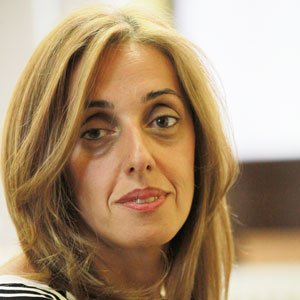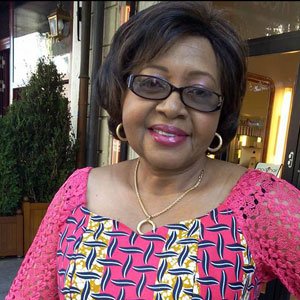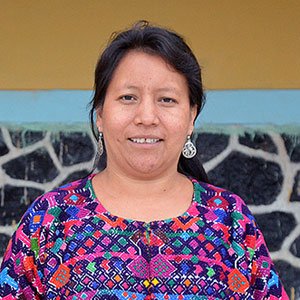2015
THE WOMEN HAVE WINGS AWARDS
Fela Rezafinjato
Madagascar
Fela Rezafinjato has always been at the forefront of the fight for the recognition of the rights of persons with disabilities in Madagascar. In 2011, she decided to dedicate her expertise and activism to bringing the double discrimination experienced by women with disabilities to the centre of the political discourse by creating AFHAM, the first and only nation-wide network of women living with disabilities in the country.
Under her leadership, AFHAM has been advocating with local and national authorities for the adoption and implementation of policies that respect the human rights of women living with disabilities. As a consequence of her relentless advocacy, in December 2014, the Madagascar Assembly approved the law authorising the ratification of the UN Convention on the Rights of Persons with Disabilities, which had been pending since 2007.
Under her leadership, AFHAM has been able to train women with disabilities throughout the country, developing their leadership skills and knowledge of human rights, and inspiring them to raise their voice to have them respected. With her example of activism, involvement and leadership, Ms Rezafinjato is without doubt, a role model for women with disabilities in her country.
Svjetlana Timotic
Serbia
Svjetlana Timotic has been a leading light in the feminist movement in Serbia and works to include the rights and perspectives of disabled women in the feminist movement’s analysis and actions. For example, she was elected to the board of the Women against Violence Network, a national coalition of twenty-eight different NGOs in nineteen different towns in Serbia that is providing support to women and working to reduce violence against all women in Serbia.
Under her leadership, Iz Kruga has worked tirelessly to engage professors and students at the University of Novi Sad in Vojvodina to advocate for the introduction of courses on Feminist Disability Studies as well as promote stronger investments in Disability studies at the University. By working through universities and educating a wide base of young people and thought leaders in the country, their aim is to ensure that the wider Serbian society changes their negative perceptions around disabled women and instead embraces a rights-based and affirming understanding of disability.
Also, under her leadership, Iz Kruga Vojvodina has created safe spaces for disabled women to meet and build community. These safe spaces provide an opportunity for disabled women in Serbia to both realise their right to be free from violence as well as learn concrete ways in which they can exercise their rights. They also host art workshops which are a valuable avenue for the communities of disabled women to build their self-esteem so as to better engage with and change a society that discriminates them. Ms. Timotic’s work and leadership within the feminist and disability rights movements in Serbia has built a strong base of conscious disabled women who are working to transform Serbia.
Yasmine Soraya
The Netherlands
Yasmine Soraya has had a pivotal function in the development of her organisation. Shortly after the formation of the group, in 2011, the then Chairman of Indonesian Migrant Workers Union (IMWU) passed away and in the period that followed Ms. Soraya was the main person to manage the process of collective grief by the members and ensured that the organisation set up a flourishing structure in the four cities in the country with most Indonesian migrants.
Ms. Soraya is a bridge-builder within her migrant community. IMWU is a support and advocacy organisation for Indonesian migrant workers in the Netherlands. Most of the migrants are in domestic work, doing cleaning, gardening or babysitting. The large majority of them are undocumented. Ms. Soraya is successful in encouraging solidarity between documented and undocumented migrants, thereby ensuring a platform for all voices of the migrant community to be accounted for. An example is the film ‘Dispereert niet!’ produced by IMWU in which many undocumented migrants feel safe and tell their personal stories without being anonymised.
Ms. Soraya opens up new possibilities. She advocated with the Indonesian embassy in the Netherlands for the possibility to have passports renewed and was successful. This embassy now can renew passports for Indonesian citizens. This is a major achievement, as before many Indonesian migrants became undocumented once their passports expired. The embassy is also willing to work further with Ms. Soraya and IMWU, for instance by lending Ms. Soraya assistance in the organisation of a tour through Indonesia in July and August 2015 in which she will speak with local authorities about their responsibility and actions in relation to migration from Indonesia, a topic that was a taboo for many years.
Obiageli Nwankwo
Nigeria
Obiageli Nwankwo is a retired Chief Magistrate in Nigeria and currently the Executive Director of the Civil Resource Development and Documentation Centre (CIRDDOC), based in Enugu, Nigeria. CIRDDOC works to assist women to acquire a basic knowledge of the laws that affect them in their daily lives, and publishes legal education materials to enhance legal literacy in society. CIRDDOC also promotes access to justice by providing free legal services to those that cannot otherwise afford to pay for them.
Nwankwo has long been visibly proactive and energetic in her efforts to engage in legislative advocacy towards the enforcement of women’s human rights. One of her most successful initiatives is an annual Women’s Human Rights Tribunal held in Nigeria in commemoration of the International Day for the Elimination of Violence against Women on November 25th. The tribunals expose violations of women’s human rights in traditional practices and present recommendations for ways to redress these violations, and are followed up with legislative advocacy at local and national levels.
Nwankwo is currently engaging the legislature towards the domestication of the Convention of the Elimination of all forms of Discrimination Against Women (CEDAW) and the African Women’s Protocol. Through working closely with legislature, Nwankwo seeks to ensure that these landmark measures that protect and promote women and girls get integrated into policies and customs on a national and district level. This courageous work will benefit women and girls for futures to come.
Miriam Pixtun
Guatemala
Miriam Pixtun has successfully led the movement known as ‘La Puya,’ a movement of indigenous Guatemalans opposing the construction of the El Tambor gold mine in their homeland. In March 2012, Pixtun led the creation of a blockade of El Tambor. The blockade is manned in shifts 24 hours a day, preventing access to and operation of the mine for more than two years. Pixtun and La Puya have continued in the face of repeated threats, intimidation and violence, including the attempted assassination of another La Puya leader in 2012. In September 2013, unknown gunmen opened fire in the main street of Pixtun’s hometown, killing 11 and injuring 15. La Puya also faces legal intimidation, and three La Puya members have each been sentenced to nine years in prison for crimes they did not commit.
Violent repression of environmental activists is common in Guatemala, and Pixtun has admitted that sometimes she fears for her life. She recognizes the danger of her work, but refuses to be dissuaded, saying, “We know that we could die in this struggle, but it is a just and necessary fight, and no matter what, we are all going to die. It is better to die defending life than not doing anything. At least our grandchildren will be able to say that we fought for something important – life in its many forms.”
In May 2014, the Guatemalan government violently evicted La Puya from the blockade camp it had occupied for more than 2 years, using heavy machinery and approximately 500 police officers. The police used clubs, stones, and teargas and injured 23 people in the eviction. In the face of this violence, Pixtun and the rest of La Puya bravely returned to continue the blockade, even though they are now surrounded by a constant police presence to add to the intimidation. Despite the massive intimidation she faces, Pixtun did a speaking tour with the Guatemala Human Rights Commission in late 2014. She traveled the U.S. sharing the story of La Puya and emphasizing the shared struggle of indigenous communities around the world. Pixtun ended her trip with a day of direct action at the headquarters of Kappes, Cassiday & Associates, the U.S. mining company that owns El Tambor.
During her speaking tour, Pixtun encouraged others to get involved, saying, “I just want to extend an invitation to all of the people here, an invitation to lose your fear. Because when we lose our fear, we will be able to see that we have rights, especially rights to a dignified life. It’s important to lose this fear in order to live this dignified life. And so I invite all of you to join us in the struggle, whether here or in Guatemala, and to understand that today we have the opportunity to do something to make a difference.”
La Puya has also gained international attention. The Nation called it “a national example of peaceful protest,” and La Puya’s camp at El Tambor has been visited by groups from Spain, Argentina, Mexico, and the U.S. In addition to challenging foreign companies and her own government, Miriam Pixtun has also challenged the machismo that was once predominant in her community. Before her work against El Tambor, Pixtun worked with the Indigenous Women’s Movement Tz’ununja’, where she dedicated more than five years to working for the rights of indigenous women. Tz’ununja’s mission is to bring together indigenous women’s organizations to demand greater participation in decision-making and promote individual and collective rights through policy proposals, lawsuits, and other programs.
In a society where politics, activism, and leadership are the territory of men, Pixtun broke with tradition to take the lead in her community and in the anti-mining movement. Her trailblazing work has led to a significant improvement in relationships between men and women. Women were once loath to speak out, but now, because of Miriam Pixtun, women are able to speak and be heard.
Miriam Pixtun exemplifies the qualities and spirit of the Women Have Wings award. With few resources, she has worked tirelessly for the rights of indigenous people, particularly indigenous women. In the face of violence and oppression, Pixtun has fought passionately and skillfully for indigenous peoples in an environment in which their rights are almost wholly disregarded and their plight largely ignored. Awarding her this prize would honour and support the crucial work that she is doing, work that she does with little recognition, little support, and enormous opposition.
Davidetta Togba Cassell
Liberia
Having survived part of the war in an Ivorian refugee camp and the rest in the chaos of Monrovia, Davidetta Togba Cassell, now fights tirelessly for the rights of girls in Liberia. She is the Founder and Executive Director of Girls Education Movement – Liberia. This NGO advances the protection and empowerment initiatives that are geared toward the transformation of young women in Liberia.






